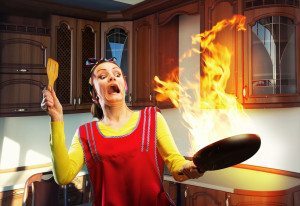Naturally you want to avoid kitchen fires, but the statistics prove that the risk is real. The American Red Cross says that cooking has been the No. 1 cause of residential fires every year for decades. It’s important that you understand the risk of kitchen-related fires and be prepared in the event of an emergency. The good news is that you can prevent kitchen fires by observing a few simple, common-sense practices.
for decades. It’s important that you understand the risk of kitchen-related fires and be prepared in the event of an emergency. The good news is that you can prevent kitchen fires by observing a few simple, common-sense practices.
Facts about Kitchen and Cooking-Related Fires
The U.S. Fire Administration reports that there were 182,000 cooking fires in the United States in 2012, with 145 deaths, 4,425 significant injuries, and more than $555 million in property damage as a result.* Kitchen fires happen when people fail to follow basic safety practices or are not prepared to deal with a cooking emergency. Once a fire breaks out in your home, you have two minutes or less to evacuate.
Be Prepared for Kitchen Emergencies
Experts agree that the best way to be prepared for a kitchen fire is to keep a fully charged fire extinguisher within easy reach at all times and know how to use it. Local fire departments and the Red Cross frequently offer free fire safety courses. Involve your children in learning fire safety practices as soon as they are old enough. Teach them about fire and burn risks as toddlers, and demonstrate “stop, drop and roll” as soon as they can walk. Know what to do if a kitchen fire does break out and understand the difference between grease fires and other types of fires. Never put water on a grease fire. Instead, turn off the burner and place a lid on the pot if you can safely do so. Baking soda is also an effective means of extinguishing grease fires. Have a fire escape plan for your family and practice it often. If in doubt, get out of the house and call 911.
Use Safe Cooking Techniques
The Red Cross is adamant that the best way to avoid cooking fires is to never leave any broiling, grilling or frying food unattended. If you must leave the kitchen, even for a second, turn it off. For other foods left unattended while cooking, check on them regularly using a timer to remind you. Don’t wear loose clothing, especially big sleeves, such as those on a bathrobe. Teach your kids that the stove is always a kid-free zone. Set up a “no-go zone” of at least 3 feet and enforce it diligently. Keep your stove and range hood free of grease buildup and keep combustibles (curtains, potholders, towels, wooden items, papers/paper bags and fake plants) away from the range and anything else that produces heat, such as a toaster. Keeping pot handles turned inward and out of reach will help prevent fires as well as burns. Finally, make sure your appliances are in good working order and properly plugged into a grounded outlet.
Keeping your range and vent hood well maintained is an important part of kitchen safety. In the Salt Lake City area, Complete Appliance Repair specializes in maintaining your appliances, ensuring they are safe and reliable. Contact them today to schedule a preventive maintenance service call for your stove. Ask your technician for additional tips and tricks to help you avoid kitchen fires.


 kitchen. Besides making you sick, a contaminated or dirty icemaker can result in several unpleasant consequences. Read on for some helpful tips for cleaning this appliance.
kitchen. Besides making you sick, a contaminated or dirty icemaker can result in several unpleasant consequences. Read on for some helpful tips for cleaning this appliance.